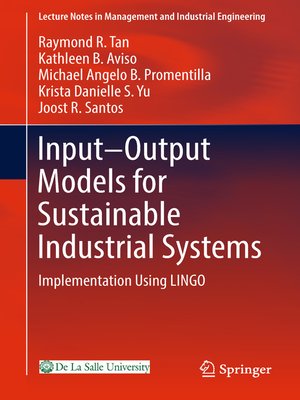Input-Output Models for Sustainable Industrial Systems
ebook ∣ Implementation Using LINGO · Lecture Notes in Management and Industrial Engineering
By Raymond R. Tan

Sign up to save your library
With an OverDrive account, you can save your favorite libraries for at-a-glance information about availability. Find out more about OverDrive accounts.
Find this title in Libby, the library reading app by OverDrive.



Search for a digital library with this title
Title found at these libraries:
| Library Name | Distance |
|---|---|
| Loading... |
This book addresses the specialized topic of input–output models for sustainable industrial systems. While these models are well-established tools for economic analysis, their underlying mathematical structure is also applicable to the analysis and optimization of a wide range of systems that are characterized by linear interdependencies among their components. This means that input–output models can be used for diverse networks, such as processes within industrial plants, industrial plants in a supply chain, or departmental units within an organization. The models can also be readily extended to interactions between man-made systems and the environment, e.g. flows of natural resources and/or pollutants. Furthermore, model variants with excess degrees of freedom can be formulated to allow optimization and decision-making to be integrated within the framework. This book examines how input–output models can be applied to sustainable industrial systems. Each major variant is discussed separately in a dedicated chapter, and representative case studies and supporting LINGO code are also included.







